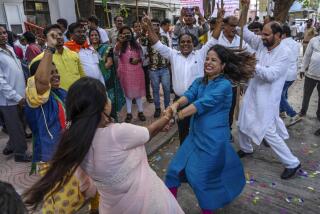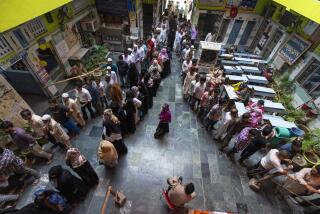Elder Statesman Succeeds Gandhi as Head of India’s Congress-I Party : Politics: Rao, former foreign minister, is selected after widow rejects post.
- Share via
NEW DELHI — In a stopgap move to bolster its fraying image, the party of slain Indian leader Rajiv Gandhi on Wednesday named a respected elder with little personal standing or ambition to lead it through next month’s crucial election.
The Congress-I Party’s 18-member central Working Committee, meeting here in the capital, voted unanimously--as expected--to elect P. V. Narasimha Rao, a former foreign minister and 69-year-old party veteran, to succeed Gandhi as party president.
The vote, a week after the assassinated leader’s widow, Italian-born Sonia Gandhi, stunned party elders by firmly and repeatedly rejecting their attempts to draft her for the post, was primarily meant to blunt growing internal rivalries over the power vacuum in a party where the leadership traditionally has passed from generation to generation within a single family.
Rao did not face the press after his election was announced. In a written statement, he praised Gandhi’s widow for her “personal courage” and called upon his party colleges to unite.
“This is a time when every member of the Congress must rise above himself or herself to serve the motherland with unity, dedication and sacrifice,” he declared.
For the 106-year-old party that has governed India for all but six of its 44 years of independence, “this is an hour both of the deepest gloom and the greatest challenge,” he added.
In interviews with The Times earlier week, most Congress-I leaders conceded that Rao’s appointment is merely a move by the party to put on its best possible face for next month’s elections and little more than a Band-Aid for the party’s deepening internal wounds.
One senior party member who asked not to be identified by name called the selection “an attempt at an equitable, if temporary, power-sharing” during the coming two weeks of campaigning before the final two days of the parliamentary elections, which were suspended when Gandhi was killed May 21 by a suicide bomber at an outdoor rally in south India.
“The real story is after the 16th,” this source said, referring to the day after balloting concludes next month. “This is the phony war stage right now, and everybody understands that. The real war starts when the polls close.”
Rao’s appointment leaves open the issue of the party’s candidate for prime minister, and fierce internal squabbling is likely to ensue among the party’s regional bosses when the time comes to decide on a permanent replacement for the Gandhi-Nehru family.
Rao understands his temporary role. The gentle elder statesman is not even running for a seat in Parliament, making him ineligible to be prime minister. The soft-spoken leader has made it clear to the other party elders that he is tired of electoral politics, after contesting seats in all nine national elections since independence in 1947 and losing only once.
In an interview with The Times on the train carrying Gandhi’s ashes to be scattered in the sacred Ganges River this week, Rao said the party’s campaign will focus on a continued commitment to Rajiv Gandhi’s policies, an effort to consolidate what most party leaders expect to be a sympathy vote strong enough to put the party back into power.
“We have to carry this conviction to them (the voters) and make clear that our determination is no less (than Gandhi’s) and convince them that we will deliver the goods,” he said.
In his written statement Wednesday night, the new party president declared, “We will not allow Rajiv Gandhi’s dreams to die with him.”
In the interview, Rao said he is convinced that the ultranationalist Hindu revivalist force, the Bharatiya Janata Party, which remains the Congress-I’s best-organized and most popular rival, is no different from other splinter groups that have challenged the Congress-I’s rule, succeeding only twice in nearly five decades.
The Bharatiya Janata Party has increased its representation in Parliament during the last elections 80-fold over the two seats it won in 1984.
“You are talking about a very transient thing, a very recent thing, a small ripple over the sea,” Rao said.
In his public statement, he stressed that the revivalist party “only means the institutionalization of communal strife and hatred.”
Other Congress-I elders interviewed said Rao is convinced, as one put it, that “Congressmen know when to stop fighting. . . . There is a fight, no doubt, but it is not a fight that will finish the party. It has never happened in the history of Congress that the party broke its own ranks or its own government.”
But most analysts said that the Hindu revivalists represent an unprecedented threat to the Congress-I. Their organization, based largely on the grass-roots support of two highly disciplined Hindu supremacist groups, is now a nationwide network fielding candidates in all but 43 of the 543 parliamentary seats at stake in the election.
A highly charged campaign to build a temple to the Hindu divinity Rama on the site of a 500-year-old mosque, as a symbol of superiority for India’s long-disorganized Hindu majority, has catapulted the BJP from the political fringes into the national mainstream.
In their post-assassination strategy, the revivalists plan to hijack the centerpiece of Gandhi’s campaign with a vow to project internal party discipline nationwide and restore stability to a nation rent by insurgency, religious hatred, widespread lawlessness and the spiraling cycle of killing.
Veteran Congress-I leaders like Rao bristle at this attempt to co-opt their stability and progress plank.
“You cannot have stability without secularism,” said one senior party member.
“How does one visualize stability under the BJP?” asked another, disbelief in his voice. “For heavens sake, a man wants a government. Where is he going to get a government when the BJP has just nothing there at the roots. . . . How are the 100 million Muslims going to get stability from a party that is so openly anti-Islam?”
For the pragmatists within the Congress-I, state party bosses such as Arjun Singh of Madhya Pradesh, who is likely to figure prominently among the regional power brokers who will battle for ultimate leadership of the party after the polls, the only way to combat the BJP campaign is return the focus to the party’s star campaigner--Rajiv Gandhi.
“I think we should say very loud and clear that what Rajiv was fighting for are articles of faith with us as well, and that we will not rest until we achieve what he tried to achieve,” Singh said.
That strategy to keep the focus on the assassinated leader was clear this week on the train where the party elders spent hours discussing and refining it.
Gandhi’s ashes, in 22 large copper urns--one for each Indian state--have been paraded for the past two days on trains, buses, carriages and trucks, in what amount to campaign rallies that each of the Congress-I’s state presidents have organized.
Profile: P. V. Narasimha Rao
Born: June 28, 1921
Birthplace: Karimnagar, Andhra Pradesh state
Education: Nagpur and Bombay, degrees in science and law.
Personal: A farmer’s son and lawyer turned politician, Rao was a Congress Party activist during the struggle for independence from Britain. Veteran party bureaucrat, with more than five decades of service to his credit; high posts have included home minister, defense minister, foreign minister. Scholar, linguist, poet; widower with eight children.
Quote: “We will not allow Rajiv Gandhi’s dreams to die with him.”
More to Read
Sign up for Essential California
The most important California stories and recommendations in your inbox every morning.
You may occasionally receive promotional content from the Los Angeles Times.













